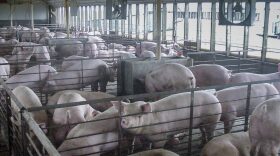This is the third in a five-part series titled “Scaling Up.” Each week, we’re releasing a new graphic explaining one way the pork industry has changed in recent years.
A majority of hogs produced in the U.S. are sold under production contracts, according to a report from the U.S. Department of Agriculture.
Under most production contracts, a hog farmer and a buyer — often large pork companies like Smithfield, JBS or Triumph Foods — agree on a fixed price for the hogs before they’re ready to be sold.
The specifics of production contracts vary by farmer and by company, but in many cases, the company pays for the pigs, feed, veterinary care and transportation while the farmer provides equipment, housing and labor. Contract farmers also have to abide by certain production standards and regulations imposed by the buying company.
For independent producers — those operating without production or marketing contracts — the farmer controls and pays for all aspects of the farm’s operation.
Production contracts can provide farmers with stability by lowering the up-front costs of production and providing protection against unexpected drops in hog prices. On the other hand, in the poultry industry where production contracts are the norm, federal authorities have accused executives of using contracts to drive down prices.
As the meat industry as a whole has become more concentrated and a handful of large companies have more control over the market, advocates are concerned that the dominance of production contracts will lead to lower prices for producers.
A bill currently under consideration in the U.S. Senate is attempting to tackle the issue of producer exploitation by creating an Office of the Special Investigator for Competition Matters in the USDA. The investigator would be charged with enforcing the Packers and Stockyards Act, which includes protections for producers but is rarely enforced.
Steve Etka, policy director of the Campaign for Contract Agricultural Reform, a national alliance of nonprofit organizations working on providing a voice for contract farmers, told Investigate Midwest in August that contract farmers rarely speak out about poor treatment from meat companies out of fear of retaliation.
“(Farmers) are so vulnerable because of a lack of clear regulations to define the prohibitions in the (Packers and Stockyards Act),” Etka said. “The USDA just hasn’t been able to do much to provide the protections for them that were in the act.”
Next week: we’ll show how the cost of production has decreased over time.



